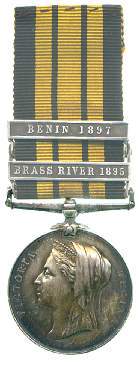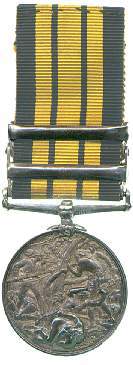Current Location: In storage
Maker(s)
Mint:
London
Artist:
Wyon, Leonard Charles
Artist:
Poynter, Edward John
Ruler:
Victoria (1837-1901)
Ruler:
Victoria regina
(With the title of)
Entities
Categories
Description
Peace-keeping operations in the British possessions in Africa, as anywhere else, required a large number of small campaigns, several of which, from 1892 until 1900, were considered to merit this medal, which in terms of design is a continuation of the Ashantee War Medal. Recipients who held that medal already were therefore awarded only extra clasps.
The Brass River, or Benue River as it is now known, is a tributary of the Niger River, and in the 1890s the tribes local to it, whose ruler King Koko had his capital at Nimbe in modern Nigeria, were increasingly concerned about European inroads into the palm-oil trade, which threatened their livelihoods. In January 1895 the Royal Niger Company's station at Akassa was attacked and more than forty people killed. Reprisal was carried out by four ships of the Royal Navy within a month and Nimbe partially destroyed. For this expedition the Brass River bar was awarded. The Benin 1897 bar was given for involvement in the 1897 conquest of the previously independent Kingdom of Benin, which had existed since the 14th century. This campaign was occasioned by the slaying of eight British representatives there in 1896, in a time of increasing tension over the palm-oil trade, which Benin protected fiercely. The resultant Punitive Expedition captured and looted Benin City, which is now in Nigeria. The bar was awarded to personnel of the Navy not for this attack, however, but for the capture of the seaboard towns of Gwato (Ughoton) and Sapobo.
This medal was awarded to Able Bodied Seaman S. G. Monk, who served in both these campaigns aboard the 3rd-class cruiser HMS Barossa. Lester Watson purchased the medal at some point from the London dealer Spink before 1928.
Notes
History note: Gift of L. Hoyt Watson; ex Lester Watson Collection, bt Spink before 1928
Legal notes
Given by Lester Watson through Cambridge in America, 2009
Measurements and weight
Diameter: 36.2 mm
Weight: 42.11 g
Acquisition and important dates
Method of acquisition: Given
(2009)
by
Watson, Lester
Dating
1892
-
1900
Materials used in production
Silver
Techniques used in production
Struck
Inscription or legends present
Inscription present: Bust of Victoria facing left with veil
- Text: VICTORIA REGINA
- Location: Obverse
- Type: Design
Inscription present: Scene of bush fighting around tree with fallen African to fore
- Location: Reverse
- Type: Design
References and bibliographic entries
Identification numbers
Accession number: CM.1204-2009
Primary reference Number: 141298
Watson Catalogue: 97
Ordering: M-0087
Previous object number: LW.0087
Stable URI
Audit data
Created: Saturday 6 August 2011
Updated: Monday 25 March 2024
Last processed: Friday 16 May 2025
Associated departments & institutions
Owner or interested party:
The Fitzwilliam Museum
Associated department:
Coins and Medals





